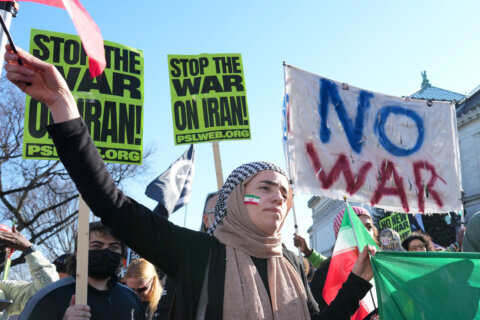Age and political affiliation appear to be playing a role in how people in the D.C. area view the coronavirus, according to a local poll conducted by Heart and Mind Strategies on behalf of WTOP.
The poll showed younger people are more concerned than older people, even though health officials have said the virus is more dangerous for senior citizens.
“This is the age group that typically thinks that they’re sort of invincible,” said lead researcher Erin Norman. “Statistically, it’s the population that’s least likely to get caught up in the fatality rate.”
According to the poll, 68% of area residents ages 18-34 said the coronavirus has made them very or somewhat concerned about their personal health.
That is relatively high considering 67% of people at least 65 years old answered the question the same way. The concern dropped in the middle age bracket, with 44% of people ages 45-54 saying they were very or somewhat concerned about their personal health.
Younger people are also taking more precautions than older people, the poll showed.
- More coronavirus news
- Coronavirus test results in DC, Maryland and Virginia
- WTOP coronavirus poll: More concern about effect on global economy than daily routine
- Coronavirus FAQs: What you need to know
- Tips to avoid contaminating or catching ailments from co-workers
Among residents ages 18-34, 23% said they have changed their eating habits and reduced the frequency of their grocery store shopping. Just 4% of residents at least 65 years old said they have been doing those same things.
Of residents ages 18-34, 20% have been stocking up on medicine, while just 8% of residents 65 and older said they were doing the same.
The poll also showed a divide in how people of different political views are digesting coronavirus information.
For instance, 60% of Republicans said the information being provided by the federal government made them feel confident. Just 24% of Democrats agreed with that, with 76% of Democrats saying the government information made them feel confused.
“The effort of the administration to calm fears just isn’t landing with Democrats,” said Norman.
Norman said that may explain why, on average, Democrats were more likely than Republicans to say they were concerned about how the virus might impact the economy and the health of their friends and family.
The online poll of 405 adults was conducted this past weekend, with participants from D.C., Maryland and Virginia. The estimated margin of error is plus or minus 4.8 percentage points.








